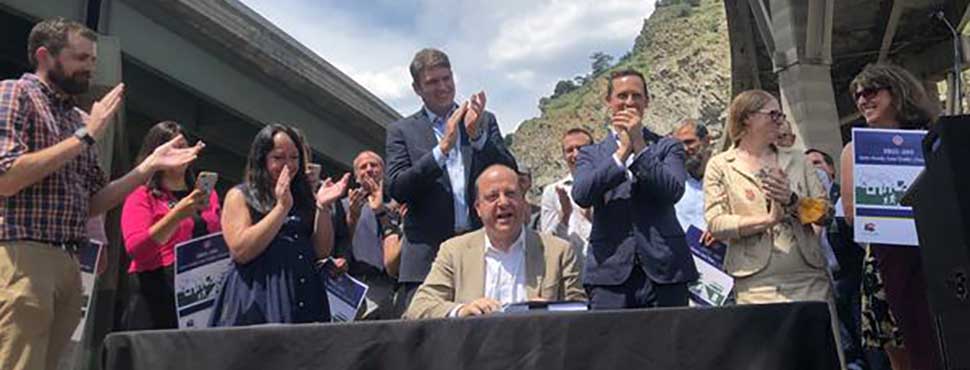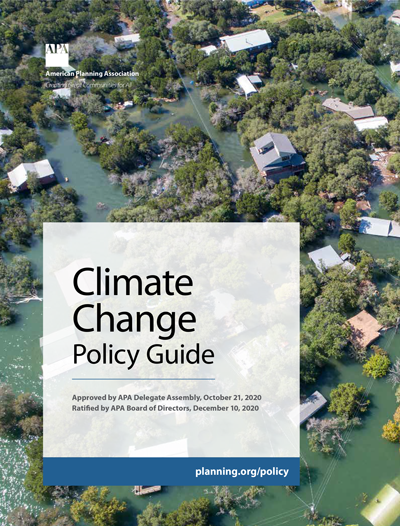States Take Aim at Carbon Emissions and Climate Consequences

Despite renewed federal leadership on climate action, states continue to do their part to create environments conducive to advancing local climate solutions.
Increasingly, state governments are finding new ways to amplify local and regional planning efforts that aim at curbing harmful carbon emissions and ensuring climate impacts do not disproportionately burden underserved communities.
Still, planners have much work to do at the state level to win support for connecting funding and programs to climate plans and performance measures. Until then, planners must continue pushing for legislative solutions that empower and invest in climate planning.
States Drive Local Climate Solutions Forward
Here is a look at some actions states are taking to help communities secure net-zero futures.
Colorado
Governor's Greenhouse Gas Pollution Roadmap
Colorado Governor Jared Polis released a policy roadmap earlier this year that outlined his Administration's plans to fully transition the state to renewable energy by 2040 and significantly reduce pollution. According to the Colorado Energy Office, the roadmap aims to "lay an achievable pathway to meet the state's science-based climate targets" established in a 2019 landmark climate law. The roadmap points to transportation, electricity generation, oil and gas development, and buildings as Colorado's biggest emitters of greenhouse gases and offers key steps for achieving new targets — including making changes to transportation planning and investment and land use planning.
While the guidance has been criticized by many for not going far enough, the announcement marked the most substantive move on climate taken by the Polis Administration to date. Still, significant legislative action is required to move forward on the ambitious goals identified in the governor's plan. One such effort failed earlier this year when SB21-200 became highly politicalized. Planners anticipate a version of the bill to resurface next session and will weigh in when the time is right.
Sustainability of the Transportation System (SB21-260)
A transportation funding bill that will raise nearly $4 billion over the next decade to address critical mobility needs and prepare Colorado's transportation network for the future was signed into law by Governor Polis this summer. Among other things, the law gives planners the tools to mitigate the environmental and health impacts of transportation system use and modernize the infrastructure needed to support the widespread of adoption of electric vehicles. The law was one of several pieces of legislation introduced during the 2021 session that aimed to set specific actions for moving Gov. Polis' climate agenda forward.
APA Colorado strongly supported SB21-260 and was actively engaged in pushing it through the General Assembly.
South Carolina
Disaster Relief and Resilience Act
South Carolina has established an office to marshal the state's efforts in stemming floodwaters and coordinating recovery and relief efforts, following five years marked by unprecedented flooding events. The Disaster Relief and Resilience Act creates an Office of Resilience that will incorporate the current Disaster Recovery Office and handle funding for flood projects and federal disaster aid across the state.
The office will oversee a statewide plan addressing flood risks and mitigation efforts. Towns and counties will have to add resiliency measures into their comprehensive plans as well. This resilience law shows a growing recognition of the need to tackle climate change-related problems in even Republican state legislatures. As Representative Kimpson (D-SC) stated, "Not having a plan is a plan to fail."
Oregon
Addressing Climate Justice Through Land Use Planning (HB 2488) and Related Budget Request
A bill was proposed this session that would have incorporated a focus on climate planning and equity into the state's 19 Land Use Planning Goals. The goals, which guide communities' and counties' land use decisions, do little to address climate impacts in their current form. They also fail to ensure that underrepresented communities can engage in critical land use decisions.
Alongside this effort, Governor Kate Brown included $800,000 in her proposed 2021-2023 state budget to move this work forward. Though the climate language was stripped from HB 2488 and the related funding request omitted from the final budget, the support they garnered throughout the legislative process suggests momentum for future action.
Confronting climate change by creating new or updating existing statewide planning goals will continue to be the focus of advocacy efforts for APA Oregon in future legislative sessions.
Hawaii
SB 585 Requires Commission to Prioritize Nature-Based Solutions
This bill establishes a commission to systematically reduce greenhouse gas emissions and improve resiliency to climate change in alignment with the principles and goals of the Paris Climate Agreement. The commission is tasked with creating a report, and recommendations for planning, management, and adaptation for hazards associated with increasing sea level rise. It will establish climate change mitigation, adaptation strategies, and goals to lessen exposure or reduce climate risks to human safety, property, utilities, infrastructure, and the environment. Assignments to serve on the committee include the director of transportation, the directors of each of the county planning departments, the manager of the coastal zone management program, or respective designees.
Rhode Island
Act on Climate Law
Earlier this year, Rhode Island Governor Daniel McKee signed into law the Act on Climate, historic climate change legislation that puts Rhode Island on a more ambitious schedule for reducing emissions of greenhouse gases. Act on Climate makes significant amendments to the Resilient Rhode Island Act, passed in 2014, charging the state to take the lead in implementing policies needed to combat climate change by reducing pollution, promoting clean energy, and improving public health.
The law makes an equitable transition to climate compliance for environmental justice populations, redresses past environmental and public health inequities, and includes a process to address the effects of climate change on most vulnerable populations at risk of pollution, displacement, energy burden, and cost influence. It tasks the Executive Climate Change Coordinating Council, which includes the Rhode Island Division of Planning and twelve other agencies, with developing new greenhouse gas reduction plans and gives the authority to promulgate regulations needed to meet the greenhouse gas emission reduction targets.
Climate Adaptation Fund
The legislature also passed a bill establishing a climate adaptation fund that would enable municipalities and the state to apply for grants to fund projects that restore and improve the climate resilience of vulnerable coastal habitats and floodplains. Developed with input from the State Planning Council, the legislation gives priority to projects that improve community resilience and safety.
The new fund, Ocean State Climate and Resilience, would reside within the state's infrastructure bank and use a variety of state funding sources. The bill was sent to the governor's desk where he is expected to sign it soon.
Planners Vital for State Climate Plans
As states develop plans to tackle the impacts of a changing climate, planners' involvement in policy debates will continue to be critical.
Planning is the only profession working at the intersection of transportation, development, and land use — the sectors most critical to climate mitigation and adaptation. Our unique perspective positions us to help decision-makers identify solutions that meet ambitious targets, protect the vulnerable, and advance local visions for the future.
APA Climate Change Policy Guide

Advocating For a Safer and Net-Zero Future
Using planning to link infrastructure investments and development standards to performance is the best way to meet ambitious climate targets, protect vulnerable communities, and advance local visions.
APA's Climate Change Policy Guide arms planners with guidance for creating locally and regionally tailored climate policies, plans, programs, projects, standards, and regulations.
Top Image: Colorado Governor Jared Polis signs into law an APA Colorado-backed transportation and climate bill that will equip planners with tools to modernize infrastructure and mitigate the health and environmental impacts of transportation system use. Photo Scott Franz, KSJD.


